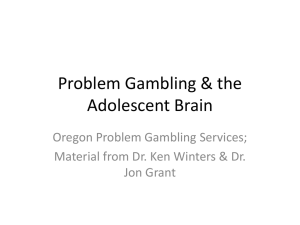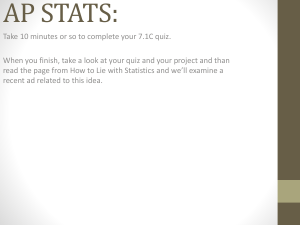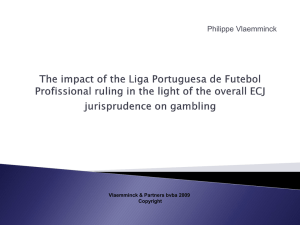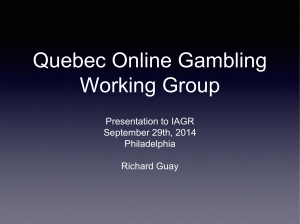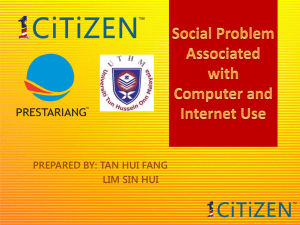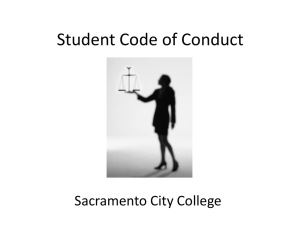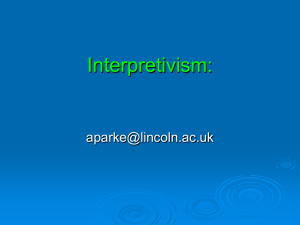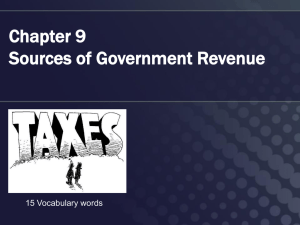Motivations and Cognitive Biases - Holtgraves
advertisement
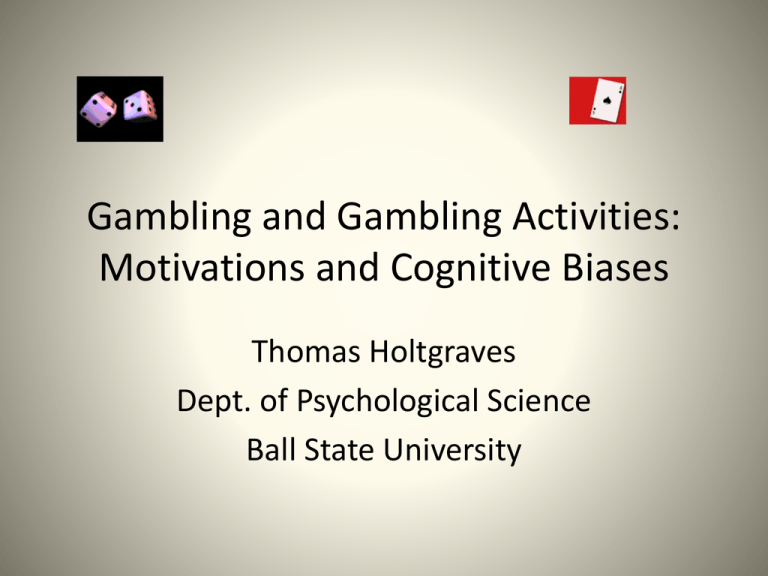
Gambling and Gambling Activities: Motivations and Cognitive Biases Thomas Holtgraves Dept. of Psychological Science Ball State University Overview • Gambling is a complex activity that takes many different forms • Understanding gambling (popularity; pathological gambling) requires an understanding of its different forms and different underlying motivations Proposed DSM V changes • Change from Impulse-Control Disorders Not Elsewhere Classified to Substance-Related Disorders which will be renamed Addiction and Related Disorders. • Eliminate illegal acts (#8) as criteria. • Need 5 out of 9 criteria Gambling Definition • Gambling - wagering something of material value on an event with an uncertain outcome. Ancient and Universal Activity Types of Gambling Casino Craps, 21, slots, keno Sports betting (football, basketball) Lotteries Race track (horse, dog) Internet (everything) Stock market Differences between Games • • • • • • • Skill vs. chance (Poker vs. ‘21’ vs. roulette) Speed of play (Slots vs. keno) Speed of outcome (Slots vs. sports betting) Social vs. Nonsocial (Slots vs. craps/21) Availability (Internet vs. live casinos) Wager Limits (Lotteries vs. Casino 21) Expected Value (Craps vs. slots) Why People Gamble • Surveys (Lloyd et al., 2010;) of self-reported reasons for gambling generally indicate: – Make money – Excitement – Escape – Social Gambling Cognitions: What are People Thinking? • People report gambling to make money • But negative expectancy (for most games) • Cognitive Distortions – Humans poor at processing probability information – Features of gambling games foster distortions • Warning labels on slot machines? Gambling Cognitions • Representativeness (Kahneman & Tversky) – Judge probability of event based on similarity to parent population (and ignore other relevant factors such as base rates) • Gambling manifestations: perceptions of chance Gambling Cognitions • Conceptions of Randomness • Lottery Choices (Holtgraves & Skeel, 1992) in Indiana Pick 3 lottery: – Which lottery number would you prefer to play? • 444 492 392 558 150 Lab studies Indiana lottery numbers played 332 Gambling Cognitions Gambling Sequences Outcome Sequence (Metzger, 1985): – Roulette sequence: BBRBBBBBBBB – Which outcome is most likely on next trial? – Gambler’s Fallacy Won/Loss Sequence – Blackjack sequence: LLWLLLLLLLLLL – Hot hand: WWLWWWWW Empirical casino evidence for both (Croson & Sundali, 2005) Gambling Cognitions • Near Miss – Unsuccessful outcome but close to win • 2 cherries on machine • lottery number is one off • Blackjack; 19 against dealer 20 – In terms of probability shouldn’t matter • Slot machines: Near misses result in longer play (Cote et al., 2003), but only up to a point (Kassinove & Schare, 2001). Near Miss – Neurological Correlates • Neurological effects (Clark et al., 2009; Chase & Clark, 2010). – fMRI imaging while playing simple slot machine – Near-miss trials activate same midbrain regions (primarily ventral striatum) as win – SOGS (PG measure) correlated with activation for near miss but not win Gambling Cognitions • Disordered cognitions may be related to gambling pathology Near miss and neural activation Chasing (major behavioral criteria for PG) partly reflects the Gambler’s fallacy PG more likely to display distorted cognitions (Griffiths, 1994). Belief in gambler’s fallacy correlated with CPGI scores (Holtgraves, 2009) Different Games – Different Cognitions Some Games Prompt Different Distortions • Self-serving attributions (Miller & Ross, 1975): – Internal attributions for success (i.e., skill) – External attributions for failure (i.e., luck) • Gambling: allows one to maintain positive selfview regardless of outcome – Especially likely for games involving both luck and skill (e.g., poker; 21) – Less likely with ‘low skill’ games (but, choosing which slot machine to play) Gambling Cognitions • Illusion of Control (Langer, 1975): Overestimate control over chance outcomes – Games with perceived skill element (e.g., causality; choice) contribute to illusion of control – Contributes to gambling persistence and wagering Gambling Cognitions Illusory Gambling Skill Elements Causality Examples: Craps, 21, slots Evidence: Crap tables: Higher wagers when shooting (Davis et al., 2009) Choice Examples: Lottery, Keno, etc. Evidence: Horses/Lotteries Mood Based Motivations Blaszcynski et al., 1986; 2002. Two major arousal-based motivators: Reduce arousal – Induce dissociation (escape) Low skill, nonsocial, activities (slots) Increase arousal – Seek excitement High skill, social, activities (craps) Gambling Motivation Differences – Empirical Research • Factor Structure (Loadings) for Frequency of Engaging in Different Gambling Activities (Holtgraves, 2009) • • • • • • • • • Activity Sport select Internet Bookie Horse racing Lottery Raffle Bingo Slots/VLT Factor 1 .755 .725 .880 .704 .162 .112 .057 .296 Factor 2 .220 .044 .133 .267 .775 .606 .736 .700 Gambling and Personality – Differences between Games • Relatively little evidence • Slowo (1997). Australia – Casino games – Higher on arousal seeking, excitement seeking, and activity than pokermachine players Gambling and Personality: Gender Differences PG: 2:1 Male:Female ratio PG: Different time course for males/females Mood motivations: Excitement for males Escape for females Social Motivations • Social interaction opportunities (3rd in list; after money and excitement; Neighbors et al., 2002) • Allow for self-presentation – Display character (Goffman) – Winners and graceful losers perceived more positively (Holtgraves, 1987) • Risky Shift – Greater risk in presence of others (Blascovich et al., 1970). Gambling Differences Games differ in affordances Are Some Games More Addicting than Others? Is the playing of some games more likely to result in PG? Are PG more likely to play certain games? Gambling Differences • Electronic Games (slots, poker, etc.) • Crack cocaine of gambling? – Speed of play, low stakes, low skill, availability, lights and sounds (availability of wins; additional reinforcers; social recognition) – Breen & Zimmerman (2002). Survey of PG: Machine gamblers progress to PG in 1.08 years (vs. 3.58 yrs. for others). Electronic Games • PG favorite game: Highest (9.7%) for EGM (Productivity Commission, 1999). • PGSI (continuous PG measure) as criterion; frequency of slots/VLT largest beta weight (Holtgraves, 2009). • However, conversion rate not greater for slots/vlts Internet Gambling • High availability (but legal issues in U.S.) • Anonymity • Evidence is mixed – Canadian data (Holtgraves, 2009) – high conversion rate for internet, but low association with PGSI Summary • Gambling is complex and multi-faceted • Multiple motivations and distortions • Games differ in affordances and likelihood of distortions • Different routes to PG • More U.S. research needed DSM-IV DIAGNOSTIC CRITERIA The following are the diagnostic criteria from the DSM-IV for 312.31 (Pathological Gambling): Impulse Control Disorder A. Persistent and recurrent maladaptive gambling behavior as indicated by at least five of the following: 1. is preoccupied with gambling (e.g., preoccupied with reliving past gambling experiences, handicapping or planning the next venture, or thinking of ways to get money with which to gamble) 2. needs to gamble with increasing amounts of money in order to achieve the desired excitement 3. has repeated unsuccessful efforts to control, cut back, or stop gambling 4. is restless or irritable when attempting to cut down or stop gambling 5. gambles as a way of escaping from problems or of relieving a dysphoric mood (e.g., feelings of helplessness, guilt, anxiety, depression. 6. after losing money gambling, often returns another day in order to get even (“chasing” one’s losses) 7. lies to family members, therapist, or others to conceal the extent of involvement with gambling 8. has committed illegal acts, such as forgery, fraud, theft, or embezzlement, in order to finance gambling 9. has jeopardized or lost a significant relationship, job, or educational or career opportunity because of gambling 10. relies on others to provide money to relieve a desperate financial situation caused by gambling B. The gambling behavior is not better accounted for by a Manic Episode.
